Discover The History of Egypt Podcast
The History of Egypt Podcast

The History of Egypt Podcast
Author: Dominic Perry
Subscribed: 17,127Played: 544,738Subscribe
Share
© Dominic Perry
Description
Ancient Egypt, from Creation to Cleopatra. This podcast tells the story of pharaonic Egypt "in their own words." Using archaeology, ancient texts, and up-to-date scholarship, we uncover the world of the Nile Valley and its people. Hosted on the Airwave Media Network.
384 Episodes
Reverse
Why is the Battle of Kadesh so famous, compared to other ancient conflicts? What can we take away from Ramesses' account in terms of "truth" vs "rhetoric." And what did it all up to, really? Prof. Peter Brand returns to discuss the battle in great detail, from the blow-by-blow moments to the larger strategic and political context. Along the way, we learn why Ramesses is like Rambo, and take a whimsical visit to medieval Bohemia...
I'll be doing a livestream about the "Art of Kadesh" on Sun 07 September (UK time). See it at my YouTube channel https://www.youtube.com/@ancientegypthist
Prof. Peter Brand’s book Ramesses II: Egypt’s Ultimate Pharaoh is available now through Lockwood Press and all good retailers.
Other articles and publications by Prof. Peter Brand at Academia.edu.
Learn more about your ad choices. Visit megaphone.fm/adchoices
Who won? In the aftermath of battle, Ramesses and Muwattalli withdrew from Kadesh. We discuss the short- and long-term fallout and consider the "score card" for the respective armies. Then, we spend time with the wounded soldiers, using the Edwin Smith Papyrus to understand diagnoses and treatments used by ancient Egyptian physicians (swnw). Finally, we explore a curious hypothesis, suggesting that Ramesses practiced a form of "decimation" on his troops...
Kadesh LIVESTREAM Sunday 07 September (UK time) on “The Art of Kadesh” via our YouTube channel https://www.youtube.com/@ancientegypthist
Want more medicine? My interview with Dr. Bob Brier is available at https://open.spotify.com/episode/3mOg7BanFze6F4DYbSWT4K and my YouTube channel: https://youtu.be/h8I6M7-czYA
The Edwin Smith Papyrus: Breasted, J. H. (1930). The Edwin Smith Surgical Papyrus (Vols. 1–2) free online: https://hdl.handle.net/2027/mdp.39015027232282; For a modern medical approach, see Sanchez, G. M., & Meltzer, E. S. (2012). The Edwin Smith Papyrus: Updated Translation of the Trauma Treatise and Modern Medical Commentaries.
Learn more about your ad choices. Visit megaphone.fm/adchoices
Howdy folks. In lieu of a narrative episode this week (while I recover from the quadruple-length Battle of Kadesh), I wanted to alert you to an interview I did for the Autocrat podcast (available on Spotify, YouTube, and the Autocrat website). In a lengthy conversation, we explore the full gamut of Egyptian history from the Creation, through Pharaonic era, the Late Bronze Age Collapse, and up to the Roman Empire in Egypt (and the "last hieroglyphs" ever recorded). It's a fun conversation, please check it out! Autocrat Podcast Website.
I include an excerpt from the interview here about a recent article discussing Hatshepsut's shattered statues.
Additionally, Dr. Colleen Darnell the Vintage Egyptologist will be joining us on the show soon to discuss New Kingdom military hero tales. Dr. Darnell runs regular online classes about ancient Egypt, which you can find at her website.
Learn more about your ad choices. Visit megaphone.fm/adchoices
In June of 1287 BCE (approximately), one of antiquity’s great conflicts unfolded in southern Syria. Meeting near Kadesh (Qidsha), the armies of Egypt and Hatti fought each other in a spectacular engagement. The events of that battle are recorded, somewhat grandiosely, by Ramesses II in temple art and extended hieroglyph narratives. With those as our foundation, we explore the most dramatic day in the young pharaoh’s life.
CHAPTERS
0:00 - Prologue
5:45 - Part 1: A Red Dawn
23:46 - Part 2: Sekhet Pay
42:20 - Part 3: Sutech and Ba'al
1:01:31 - Part 4: Doubling Down
1:21:56 - Part 5: White, Black, Red
1:48:58 - Part 6: Wrapping Up
==
The History of Egypt Podcast:
Website: www.egyptianhistorypodcast.com.
Support the show via Patreon www.patreon.com/egyptpodcast.
Make a one-time donation via PayPal payments https://www.paypal.com/ncp/payment/BHC6MGDBC6SXU.
We have merch! Browse our designs at Dashery by TeePublic https://egyptpodcast.dashery.com/
Learn more about your ad choices. Visit megaphone.fm/adchoices
Ramesses, Muwattalli, and the Trojans(?). In June of 1287 BCE, the Great Kings of Hatti and Egypt were on the verge of a major confrontation. Ramesses, marching across Sinai and into Canaan, made careful preparations for his assault on Kadesh. Alas, even the best-planned campaign could not be hidden from a watchful enemy. In Hatti, Muwattalli II sent calls to his vassals, summoning them to fight. The Hittite army, and its allies, is a remarkably well-documented force...
For the Kikkuli Text of horse training, see https://en.wikipedia.org/wiki/Kikkuli
and https://collections.britishart.yale.edu/catalog/orbis:9782188.
Learn more about your ad choices. Visit megaphone.fm/adchoices
Preparing for Kadesh. In 1287 BCE (late in his fifth regnal year) King Ramesses II departed Egypt on campaign. His target? The city of Kadesh / Qidsha in southern Syria. The Kadesh campaign is famous, as one of history’s “great battles.” Today, we “set the scene,” and explore the preparations for this war. We have a surprisingly detailed picture of this, thanks to inscriptions, art, and excavations. From a new royal city, Pi-Ramesses, to the enormous scale of the army, to the diplomatic manouevres (and espionage) that would accompany this campaign… the preparations for Kadesh are almost as elaborate as the battle itself.
Learn more at the Qantir-Piramesse archaeological project: https://qantir-piramesse.de/home/ort/
Digital reconstruction of Pi-Ramesses, incl. its stables, at Artefacts Berlin: https://www.artefacts-berlin.de/portfolio-item/the-reconstruction-of-pi-ramesse/
Learn more about your ad choices. Visit megaphone.fm/adchoices
Leading up to the Battle of Kadesh (c.1287 BCE) betwen Ramesses II of Egypt and Muwatalli II of Hatti, we need to understand the background. Why was this city the epicentre of such a major conflict? How did the rulers of Kadesh (Kadeshians?) persistently frustrate pharaohs dating back two centuries to Thutmose III (c.1480 BCE). Today, Prof. Peter Brand (University of Memphis) gives us the details...
Learn more about Ramesses and Kadesh in Peter Brand's book Ramesses II: Egypt's Ultimate Pharaoh (Lockwood Press).
Prof. Peter Brand at Academia.edu.
Interview recorded: May 2025.
Learn more about your ad choices. Visit megaphone.fm/adchoices
We learn how to insult someone in ancient Egyptian, based on the surviving texts...
Learn more about your ad choices. Visit megaphone.fm/adchoices
Heart of Darkness at Zawiyet Umm el-Rakham. Far from the Nile Valley, on Egypt’s northern coastline, Ramessid soldiers and civilians constructed a significant fortress to control the maritime roads. This remote garrison faced off against Libyan tribes coming from the far west (e.g. the Meshwesh of Cyrenaica), traded with Mediterranean merchants, possibly dealt with marauding pirates and Sea Peoples, and built a life for themselves on the western frontier. Alas, it wasn’t all beaches and bonhomie, as soldiers like Nebra, the commander, would learn…
Prof. Steven Snape is the author of many books and articles including The Complete Cities of Ancient Egypt (2014); Ancient Egyptian Tombs: The Culture of Life and Death (2011); Zawiyet Umm el-Rakham I: The Temple and the Chapels (with Penny Wilson, 2007); Zawiyet Umm el-Rakham II: The Monuments of Neb-Re (with Glenn Godenho, forthcoming).
Learn more about excavations and discoveries at this site in a free lecture, “ Zawiyet Umm el-Rakham and the Ramesside Defence System on the Maryut Coast,” on YouTube https://www.youtube.com/watch?v=xQ1QelBxYiU&
Steven Snape papers and publications at Academia.edu https://liverpool.academia.edu/StevenSnape
Steven Snape at The University of Liverpool: https://www.liverpool.ac.uk/people/steven-snape; Research Profile https://www.liverpool.ac.uk/people/steven-snape/research
Prof. Snape is currently reading The Arabian Nightmare by Robert Irwin (1983). Wikipedia
Learn more about your ad choices. Visit megaphone.fm/adchoices
Explicit content. There's a factoid floating around on the internet. It claims that, to ensure fertility and good harvest, pharaohs would annually masturbate into the River Nile. This claim is total bubkis, but where did it come from? Which deities and myths were most closely associated with such concepts? In this mini episode, we explore the factoid and its potential origins.
Great gods of fertility and Creation:
Allen, J. P. (1988). Genesis in Egypt: The Philosophy of Ancient Egyptian Creation Accounts.
Epigraphic Survey. (1940). Medinet Habu, Volume IV. Festival Scenes of Ramses III. Available free via The University of Chicago.
Maher-Taha, M., Loyrette, A.-M., & Sayed, S. (1979). Le Ramesseum XI: les fêtes du dieu Min.
Olette-Pelletier, J.-G. (2023). Min, l’Horus victorieux: Le dieu Min au Moyen Empire (Vol. 33).
Siuda, T. L. (2024). The Complete Encyclopedia of Egyptian Deities.
Wilkinson, R. H. (2000). The Complete Temples of Ancient Egypt..
Wilkinson, R. H. (2003). The Complete Gods and Goddesses of Ancient Egypt.
Examples of the factoid:
Anonymous, Did Egyptian Pharaohs Masturbate into the Nile? Retrieved June 16, 2025, from https://getmegiddy.com/egyptian-pharaohs-masturbate-into-nile
Margolis, J. (2003). O: The Intimate History of the Orgasm. http://archive.org/details/isbn_9780802117861
Menezes, R. (2022, March 21). Pharaohs Had the Grossest Ritual to Keep the Nile Running. Cracked.com. https://www.cracked.com/article_33015_pharaohs-had-the-grossest-ritual-to-keep-the-nile-running.html
Taylor, M. (2021). You Know What We Should Bring Back? Ritually Jacking Off into Rivers. MEL Magazine. https://melmagazine.com/en-us/story/ancient-egypt-masturbation-nile
Learn more about your ad choices. Visit megaphone.fm/adchoices
Hapi was Egypt. The life-giving waters of the annual flood (inundation) were his work; and thanks to these waters, Egypt flourished, its people were fed, the gods received their offerings, and the social order was maintained. From the New Kingdom, papyrus and ostraca record songs/poems to the river god, called "Praise (dua) of Hapi." From the days of Ramesses II, we also have elaborate proclamations to the god and his blesings...
A Hymn to Hapi (excerpt)
Hail to you Hapi, who comes forth from the earth,
Who arrives to give life to Egypt (Kemet),
Hidden of nature, like darkness in the day,
Whose followers sing to him,
Who floods the fields, created by Ra,
Who causes every herd to live,
Who satisfies the desert, which is far from water,
He (Hapi) is the moisture, descending from the sky…
...
Egypt is awakened; its exhaustion has gone!
All the creatures celebrate, when (Hapi) makes the Two Banks green.
When he pours forth abundance, among the old and young alike.
How lovely the lotus, whose blossoms dot the flood, that they may tell the happiness to come.
...
Come, O god (Hapi)… do not be slow!
Do not be cruel, reducing what we have, for you might do wrong to the innocent…
May you (Hapi) give breath to the nose, when you come.
O Hapi, do not sink into the ground…
Your perfection is here before us, so that we may turn back to your keeping; and the gods are near…
...
For more information about Hapi and Hymns to the Nile:
Foster, J. L. (1995). Hymns, Prayers, and Songs: An Anthology of Ancient Egyptian Lyric Poetry.
Lichtheim, M. (1973). Ancient Egyptian Literature Volume I: The Old and Middle Kingdoms.
Quirke, S. (2004). Egyptian Literature 1800 BC: Questions and Readings.
Siuda, T. L. (2024). The Complete Encyclopedia of Egyptian Deities.
Wilkinson, R. H. (2003). The Complete Gods and Goddesses of Ancient Egypt.
Learn more about your ad choices. Visit megaphone.fm/adchoices
What did ancient Egyptians like to smell? Did they use any narcotics in their day to day lives? And what do mummified bodies smell like? Today, I'm pleased to welcome Dora Goldsmith to the podcast.
Dora Goldsmith is a PhD-candidate at the Freie Universitat in Berlin, Germany. Specialising in ancient smellscapes, Dora explores how the ancient Egyptians perceived and described the scent of their world. Along the way, Dora introduces us to the favoured perfumes and flowers used by the ancients, some of their “recreational” substances, and how mummified bodies smell today.
Publications by Dora Goldsmith at Academia.edu https://fu-berlin.academia.edu/DoraGoldsmith
For perfumes and newsletter, email Dora Goldsmith directly at doragold@zedat.fu-berlin.de. Learn more about her reconstructions in the Ancient Egyptian Scent Kit.
Follow Dora on Instagram @prof_dora
Learn more about your ad choices. Visit megaphone.fm/adchoices
We're joining YouTube! After many years of on-off effort, I'm finally putting podcast episodes in video form up on my YouTube channel.
Also, a quick update on the narrative as a I prepare the Battle of Kadesh...
Follow us on YouTube at https://www.youtube.com/@ancientegypthist
Massive thanks to Amr Saleh for taking on the editing duties. I hope you'll all join us on an exciting journey to bring more ancient Egypt to you(tube).
Learn more about your ad choices. Visit megaphone.fm/adchoices
Hello everyone, it’s that time again! In March of 2026, we’re offering a new itinerary in the Nile Valley. This one is called the New Kingdom Cruise. It lasts for ten days, with a special focus on the south, the monuments of Elephantine (Aswan) and Lake Nasser. We ride a cruise boat, organised by Ancient World Tours, and visit monuments of Thutmose III, Sety I, Ramesses II, and even the Roman Emperors.
For bookings follow this link and use the password KALABSHA https://www.ancient.co.uk/holiday/history-of-egypt-podcast-2026-the-nubian-cruise/
Learn more about your ad choices. Visit megaphone.fm/adchoices
Ramesses II defends his borders. In the early years of his reign, Ramesses focussed on home defence. His army established new forts at remote locations along the western Delta and Mediterranean Coast (Marmarica). Traces of this work can be found at famous locations like el-Alamein, Mersa Matruh, and Zawiyet Umm el-Rakham, the latter of which has been the object of detailed excavation in recent decades. Apparently, Ramesses was fortifying his frontiers, guarding the western approaches to Egypt.
Soon after, the pharaoh went forth on campaign. His target? The cities of Canaan and Amurru, in modern-day Lebanon. Along the way, he left inscriptions at Nahr el-Kalb, which started a surprisingly long-lived tradition...
Music: "War" by Ancient Lyric (commissioned by The History of Egypt Podcast).
Website: www.egyptianhistorypodcast.com.
Support the show via Patreon www.patreon.com/egyptpodcast.
Make a one-time donation via PayPal payments https://www.paypal.com/ncp/payment/BHC6MGDBC6SXU.
We have merch! Browse our designs at Dashery by TeePublic https://egyptpodcast.dashery.com/
Learn more about your ad choices. Visit megaphone.fm/adchoices
Fellow podcaster Scott Chesworth, from The Ancient World has a new season. I’m excited to introduce “The Ancient World – Ages”, a series covering the Early Bronze Age Collapse (c. 2200 BC) and the remaking of Southwest Eurasia.
In this feed swap, you’ll hear episode A3 – The Kings of Kish. It covers the period c.2900 BCE and 2350 BCE, also known as the Early Dynastic Period in Sumer. A time of kings, emerging from legends. Figures like Gilgamesh, burial sites like the Royal Cemetery of Ur, and the legendary conflict between the gods Lagash and Umma, recorded on the Stela of the Vultures. Along the way, Scott will introduce you to history’s earliest-known diplomacy, bilateral treaty, and legal codes. Finally, Scott will set the stage for the most famous conqueror of the day: Sargon of Akkad.
The Ancient World – Ages promises to by an exciting, big picture history of this ancient period. While the Egyptians were focused on pyramids, rulers in Mesopotamia were kicking Kish and taking names. Please, consider joining Scott on this epic journey.
Website: https://ancientworldpodcast.com/
Scott Chesworth's The Ancient World is available on Spotify, Apple, and all good podcasting apps.
Learn more about your ad choices. Visit megaphone.fm/adchoices
Ramesses goes back to school. Luxor Temple is a magnificent monument, in a city full of them. The sanctuary you visit today is, in large part, the work of Ramesses' early reign. New pylons, colossal statues, obelisks, and dedicatory texts provide the testament to the young pharaoh's work. Exploring these, we also get a surprising insight into temple archives and educational facilities, embodied in the Per-Ankh / House of Life...
Outro music: Jeffrey Goodman, "Prophetic Harps of Amun-Ra," used with permission.
Website: www.egyptianhistorypodcast.com.
Support the show via Patreon www.patreon.com/egyptpodcast.
Make a one-time donation via PayPal payments https://www.paypal.com/ncp/payment/BHC6MGDBC6SXU.
We have merch! Browse our designs at Dashery by TeePublic https://egyptpodcast.dashery.com/
Learn more about your ad choices. Visit megaphone.fm/adchoices
Delta raiders. Decades before their famous migrations, the "Sea Peoples" were already active and visible in the eastern Mediterranean; and Ramesses II had his own dealings with these groups. In year 2 of his reign, Ramesses II (Usir-Ma'at-Ra) dealt with a coastal raid by the Sherden, who came from the "islands in the midst" of the sea (which the Egyptians called the "Great Green"). The battle, and its aftermath, is referenced in several of Ramesses' inscriptions. We explore this curious first chapter in the Sea Peoples' story...
Music: Michael Levy "Odysseus and the Sirens” www.ancientlyre.com
Website: www.egyptianhistorypodcast.com
Support the show via Patreon www.patreon.com/egyptpodcast
Make a one-time donation via PayPal payments https://www.paypal.com/ncp/payment/BHC6MGDBC6SXU
We have merch! Browse our designs at Dashery by TeePublic https://egyptpodcast.dashery.com/
Learn more about your ad choices. Visit megaphone.fm/adchoices
The new royal tomb, and how two 18th Dynasty rulers defined the "New Kingdom" as we know it. Prof. Aidan Dodson is a dedicated and prolific scholar, whose research covers many facets of ancient Egyptian history (and even WW1 warships!) His latest book, Thutmose III & Hatshepsut: Pharaohs of Egypt - Their Lives and Afterlives looks at how these two monarchs, and their followers, defined many of the aspects of "pharaonic culture" as we imagine it. Along the way, we also discuss the new royal tomb, its significance, and its connection to these famous figures.
Prof. Aidan Dodson at Academia.edu and the University of Bristol.
Book: Thutmose III and Hatshepsut, Pharaohs of Egypt at AUC Press.
Learn more about your ad choices. Visit megaphone.fm/adchoices
A death at Karnak, and a lion amongst men. In regnal year 1 (c.1292 BCE), Ramesses II was at Abdju / Abydos. While there, he appointed a new First Priest of Amun (Hem Netjer Tepy en Imen). He chose his candidate by consulting the deity directly, engaging in an oracle with Amun to choose the best option.
Shortly after, Ramesses departed Abdju and continued his northward journey. Eventually, he came to Giza, home of the Great Sphinx and the deity that inhabited it...
The History of Egypt Podcast:
Website: www.egyptianhistorypodcast.com.
Support the show via Patreon www.patreon.com/egyptpodcast.
Make a one-time donation via PayPal payments https://www.paypal.com/ncp/payment/BHC6MGDBC6SXU.
Music and interludes by Luke Chaos www.chaosmusick.com.
We have merch! Browse our designs at Dashery by TeePublic https://thehistoryofegyptpodcast.dashery.com/.
Learn more about your ad choices. Visit megaphone.fm/adchoices
 United States
United States



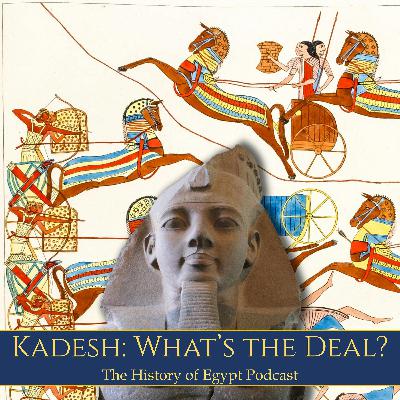
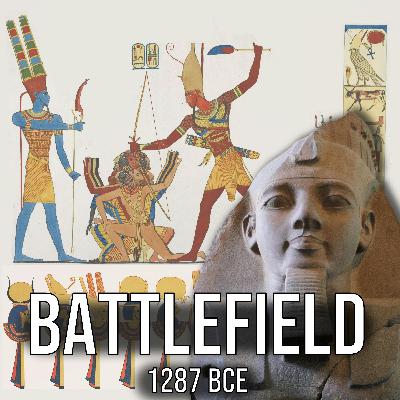
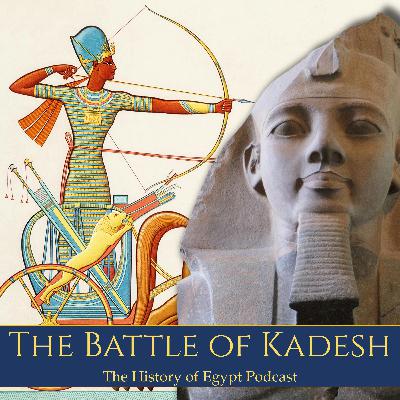
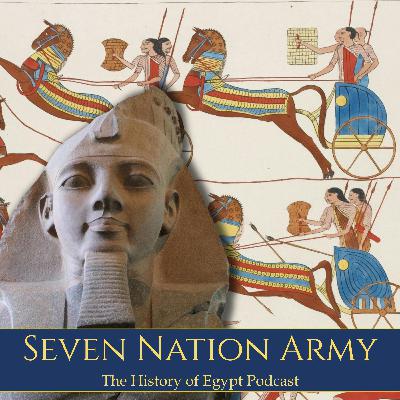
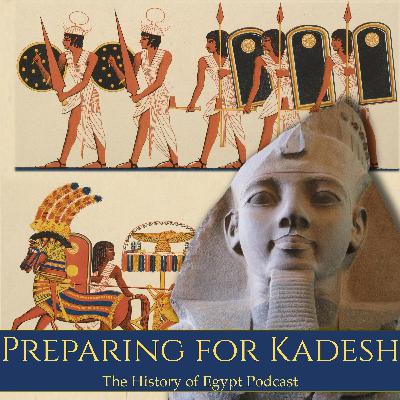
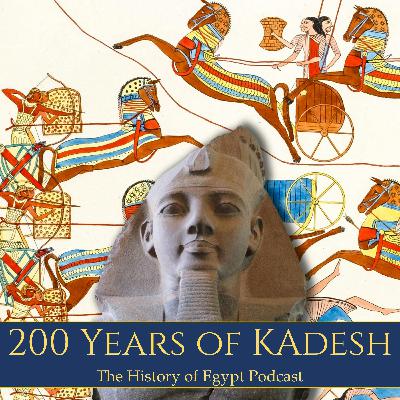
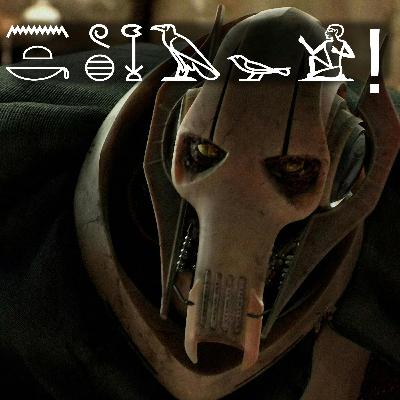
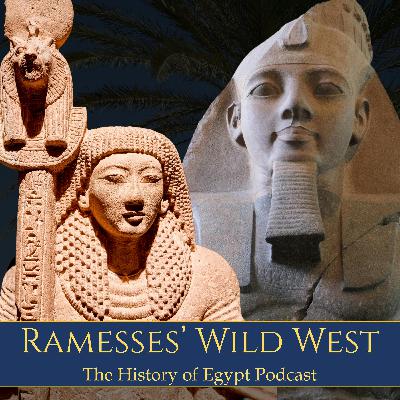
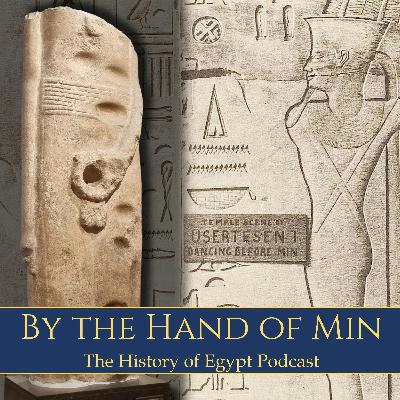
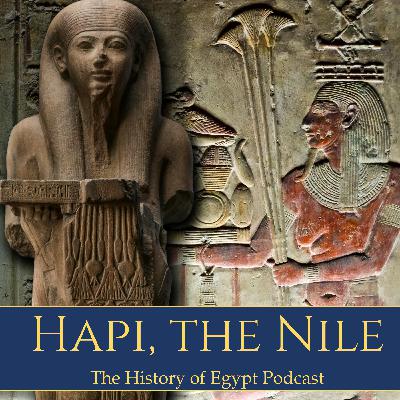

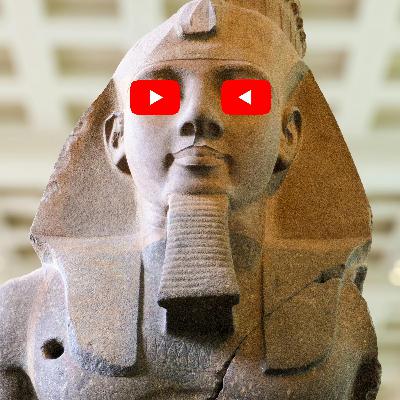
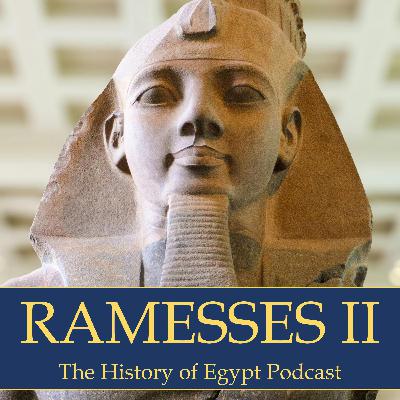
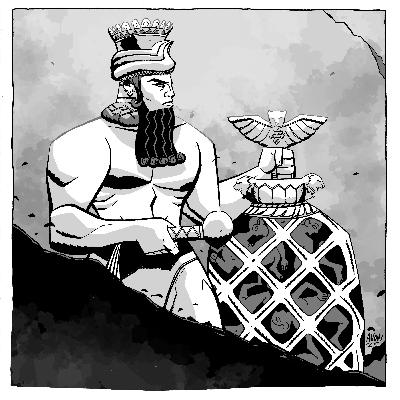



cool
that was awesome
Great podcast 👏 Absolutely fascinating 🔺️
I really enjoy your podcast and have for several years. It is in depth but not too deep for new learners. You have only recently started incorporating interviews, and I have some constructive feedback. I interview others a lot for work. You ask great questions. Your pace is good. But, you tend to say "mm-hm" quite a bit, sometimes after the guest finishes each sentence. Many reasons may explain this. I would cut back on it, as it can be distracting and perceived as if you are rushing the guest.
🔴✅📺📱💻ALL>Movies>WATCH>ᗪOᗯᑎᒪOᗩᗪ>LINK>👉https://co.fastmovies.org
thank you🙏🏻🙏🏻
Heard BCE, stopped listening and deleted the downloaded episodes. Don't steal my religion's dating system and try to excise my religion from it.
Excellent episode. I studied Horemheb's Decree at university, and it has always seemed to me to be fundamentally a self-serving document that may have had, as a byproduct, the elimination of legitimate problems facing Egypt. For instance, he punishes royal officials who take from the people. We should not jump to some populist conclusion. Undoubtedly, those officials were either expressly or implied taking in the King's name which would have caused ancient Egyptians to doubt the King's ability to preserve and promote Ma'at. Horemheb was worried about his own legitimacy as much as the people. Then, in creating a new judiciary, Horemheb asserted control over those who dispensed Ma'at. While the decree may have been well-intended, I think we have to consider Horemheb's background, the times just before his reign, how he came to power, and the difficulties he must have faced as Pharoah when interpreting the Decree. Your episode did an excellent job of reminding listeners not to take ancien
👌🏼🌹🌹🌹
looks interesting im gonna listen to it now🍿, thank you🌹
I've been learning so much with this podcast!!!!!!😍😁
thank you💕👏
seth😢😢
poor seth😿😿
thank you😍
😍👌🏼
thanks, i wonder who's the next pharoah in your podcast , and sorry about my bad english
sad🥲😪
and the next is horemheb i guess 🤭 cant wait to hear your next podcast, thanks a lot , god bless you😢🌹🙏🙏🙏
wow👌🏼